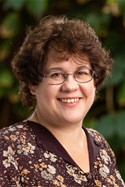What does the English major cover?
English is a wide-ranging field of study. Historically, it gives attention to the great variety of texts that human culture has produced over centuries. Conceptually, it aims at developing deep abilities in reading and writing. The Bellarmine English program emphasizes writing as a fundamental means of learning and expression; close and creative reading of a culturally diverse range of texts; and critical thinking grounded in writing and reading.
Bellarmine English graduates have gone on to success as writers and editors, in foreign relations and non-profits, in business and government, in arts and humanities, in law and medicine, and teaching in high schools and universities. They have also pursued graduate study in such areas as library science, institutional technology, technical and scientific writing, and most all humanities disciplines.
What makes Bellarmine’s English department stand out?
Small classes allow professors to become acquainted with students beyond the words on their papers and exams. The English faculty know students by name and are committed to seeing them develop their talents to the fullest.
The department also supports numerous extracurricular organizations, such as the student-run literary magazine Ariel, Pen and Sword, the Bellarmine Theatre program, and more. The department offers minors in Film Studies and Creative Writing.
The Student Perspective
 Joshua Bloom is a senior studying English. Bloom was the 2025 winner of the Annette Allen Poetry Prize, an annual poetry competition open to college students in the Louisville metropolitan area. He is considering pursuing a career in publishing or editing after college.
Joshua Bloom is a senior studying English. Bloom was the 2025 winner of the Annette Allen Poetry Prize, an annual poetry competition open to college students in the Louisville metropolitan area. He is considering pursuing a career in publishing or editing after college.
Here’s what Bloom had to say about his experience in Bellarmine’s English program:
Q: What made you want to study English?
JB: I've always been fascinated with how storytelling can affect people's lives and reflect the culture and the individual experiences of those writing it. For example, A Christmas Carol was written in the 1800s and talked a lot about the class struggle going on at the time. Even though most people's takeaway is “you’ve got to be kind,” there's actually a lot more going on there reflecting 1800s attitudes as people's ideas about class were shifting in that era. It just really fascinates me how literature does that.
Q: What has stood out to you about Bellarmine’s English department?
JB: I feel like we have a really close relationship with our professors. I'm not sure how it is [at larger schools], but I assume that there are a lot more professors, so you might not get to know them one-on-one. Because we're such a close community, there's a good sense of comfort there. When I'm in the classroom, I don't feel nervous. I don't feel out of place there. I feel like I belong.
Q: How would you describe the learning environment at Bellarmine and in the English department specifically?
JB: It's a very comfortable environment because of how close the community is. I don't find it hard to focus in any of my English classes. The teachers are really good at engaging with the students. If they're not calling on you specifically, you'll get ideas from other people that will make you want to raise your hand and contribute to that conversation. You'll take away something from every class. I'm in a Shakespeare class right now; I thought I knew stuff about Shakespeare, but, these professors, man, they just know how to get you to learn even more and make you want to learn as much as possible about those subjects.
Q: What has been your experience with the small class sizes and the community they create?
JB: We're all really good friends with each other, I would say. No one’s voice is drowned out. Everyone has a voice in the classroom because there's not 90 people in a class, it's usually 15 to 20 for an English class. So, what you say matters when you're in that class and your teachers listen to you, the people around you are listening to you. Everyone cares about what you're learning and what you have to say, how you can contribute to that conversation.
I can have conversations with [fellow students] outside of the classroom about random stuff, even if we've only had a couple classes with each other. The environment here allows you to create those kinds of friendships really quickly. Those friendships developed very quickly for me, and I'm a quiet person, too, so it surprised me how easily I was able to make friends. And even still now there will be new people in the classroom that I've never seen before and it's not hard to interact with them. For me, as a quiet person, the kind of community we have makes it easy to develop those friendships.
Q: Bellarmine is a liberal arts university, so you study many disciplines outside of your major. What's been your experience with that and how has that influenced your English studies?
JB: The science classes, specifically, I've enjoyed a lot. I took Planet Earth my first semester, and I really enjoyed that. That made me want to get more into environmental [topics]. I'm not really doing a minor, but I've taken a few classes, like Environmental Justice, and I feel like they deal with similar things [to English] in a way you wouldn't expect. You learn about the environment, but you're also learning about people, because the environment affects people and [there is a] cultural impact and societal impact of the environment. You're doing the same thing with literature. It's a study of culture. It's a study of the way people have been impacted by things going on in the world, like changes in the environment.
Q: Are you involved with any of the extracurricular activities associated with English, like Ariel?
JB: Yes, I'm actually a committee member for the Ariel executive board. There are a lot of writers [outside of the English major], and I have met a lot of talented writers just by looking at their work through Ariel.
Q: For those who don’t know, what is Ariel?
JB: It's a [student-run] literary magazine. We cover a lot of different forms of literature. We publish short fiction, poetry, nonfiction, sometimes we accept playwriting. This year we had a choose-your-own-adventure story submitted, which I think is a first, at least since I've been working on it. We also have visual art—you can do paintings, photography, things like that. So, even if you're not necessarily into the writing aspect of art, if you have any sort of artistic sensibilities there is a place for you in Ariel.
Q: What would you say to a prospective student interested in studying English at Bellarmine?
JB: I'd say go for it. Especially if you care about writing. If you think writing is something you're good at, there is a lot you can do with an English major. You'll work with great professors, great students, and you'll gain a perspective that you might not have had before. I've learned a lot in these classes, not even just about English itself. It's good for gaining different perspectives on the world. You gain a greater sense of what different communities’ experiences are like just by engaging in the literature that's been produced by those communities.
Q: Do you feel like your experience in this program has helped you find a purpose or calling for life after Bellarmine?
JB: I do. It's really made me want to help people. Before I came here, I was just wanting to be an author, but I didn't have anything specific in mind. Now, I want to use my writing to help people in any way I can. Some of the internships I've been applying for are environmentally related. I'd be a writer for these environmental non-profit groups trying to do good work for people. And I feel like being in the English major with like-minded people that want to help people, that care about people, has made me want to contribute to the world in some meaningful way with the skills that I have.
The Faculty Perspective
 Dr. Kathryn West is a professor of English and directs the Women's and Gender Studies program. Her research and teaching interests span American Literature from 1865 to the present, with a particular emphasis on Contemporary, Native American, and Women’s Literature, as well as Contemporary International Writing, particularly from Latin America and India.
Dr. Kathryn West is a professor of English and directs the Women's and Gender Studies program. Her research and teaching interests span American Literature from 1865 to the present, with a particular emphasis on Contemporary, Native American, and Women’s Literature, as well as Contemporary International Writing, particularly from Latin America and India.
Dr. West says the benefits of pursuing an English degree at Bellarmine may be best demonstrated by looking at what alums are doing. Graduates have achieved success as editors and publishers, lawyers, high school teachers, university professors, veterinarians, science writers, poets, novelists, and technical writers. Graduates have established themselves with careers in business, insurance, non-profits, and foreign relations.
A degree in English from Bellarmine can prepare you for just about anything you might want to pursue, but West says that just as important as career, vocation, and skill preparation are the life skills students develop in the English program.
“Bellarmine’s mission and values highlight innovation and creativity, providing practical, intellectual, and emotional groundings for building a meaningful life. In the English department, we practice all of these. You’ll see the practical in our instruction in writing skills, how to use language well, and how to think well and argue or debate productively. Intellectual inquiry is inherent to the study of literature, potentially reaching into any aspect of human experience. Numerous recent studies from psychology and the sciences have affirmed that reading literature increases our empathy and our emotional understanding.”
Bellarmine’s English program accomplishes this thorough education through the great variety of courses it offers. When people think of studying English, typically they imagine writing essays and reading literature. West says the department offers those in depth and variety, but that’s not the only focus.
“We go well beyond that with robust sets of classes in Creative Writing in Poetry, Fiction, Nonfiction, Playwriting, as well as topics in Environmental Justice and Grief and Recovery. But we don’t stop there. We feature a minor in Film, with courses such as Introduction to Film, Classic Hollywood Cinema, Rebels in Film, Horror Film, and the 1980s in Film, among others. The English Department also houses Bellarmine’s Women’s and Gender Studies Program.”
If you want to study a field with immense variety, English may be for you. And with Bellarmine’s small class sizes, you’ll get unrivaled support from your professors. West says an important benefit of studying at Bellarmine is the relationship students and professors build throughout the course of study, and even prospective students are encouraged to get in touch.
“Our English faculty are available to talk about your courses, career plans, passions new and old. We see our positions as designed to support, to guide when requested, to open new horizons, and to give you the tools to be prepared for your future pursuits, both personal and professional. The American poet Mary Oliver asked, ‘What is it you plan to do with your one wild and precious life?’ We’re here to help you discern the possibilities for your life and to show you how to make them possible.”
Visit the English program page for more information including program highlights, career opportunities, and contact information if you’d like to get in touch with the department.